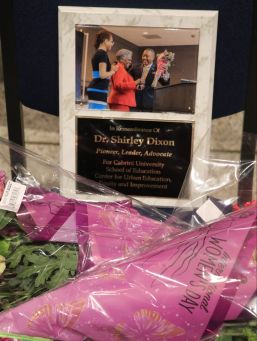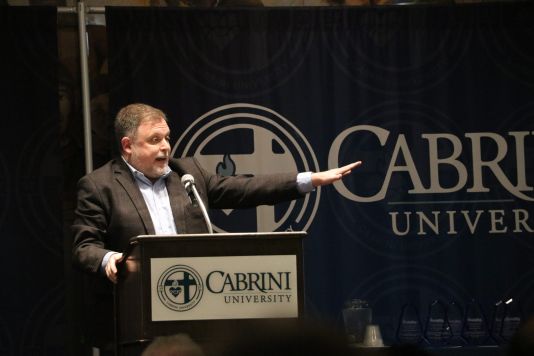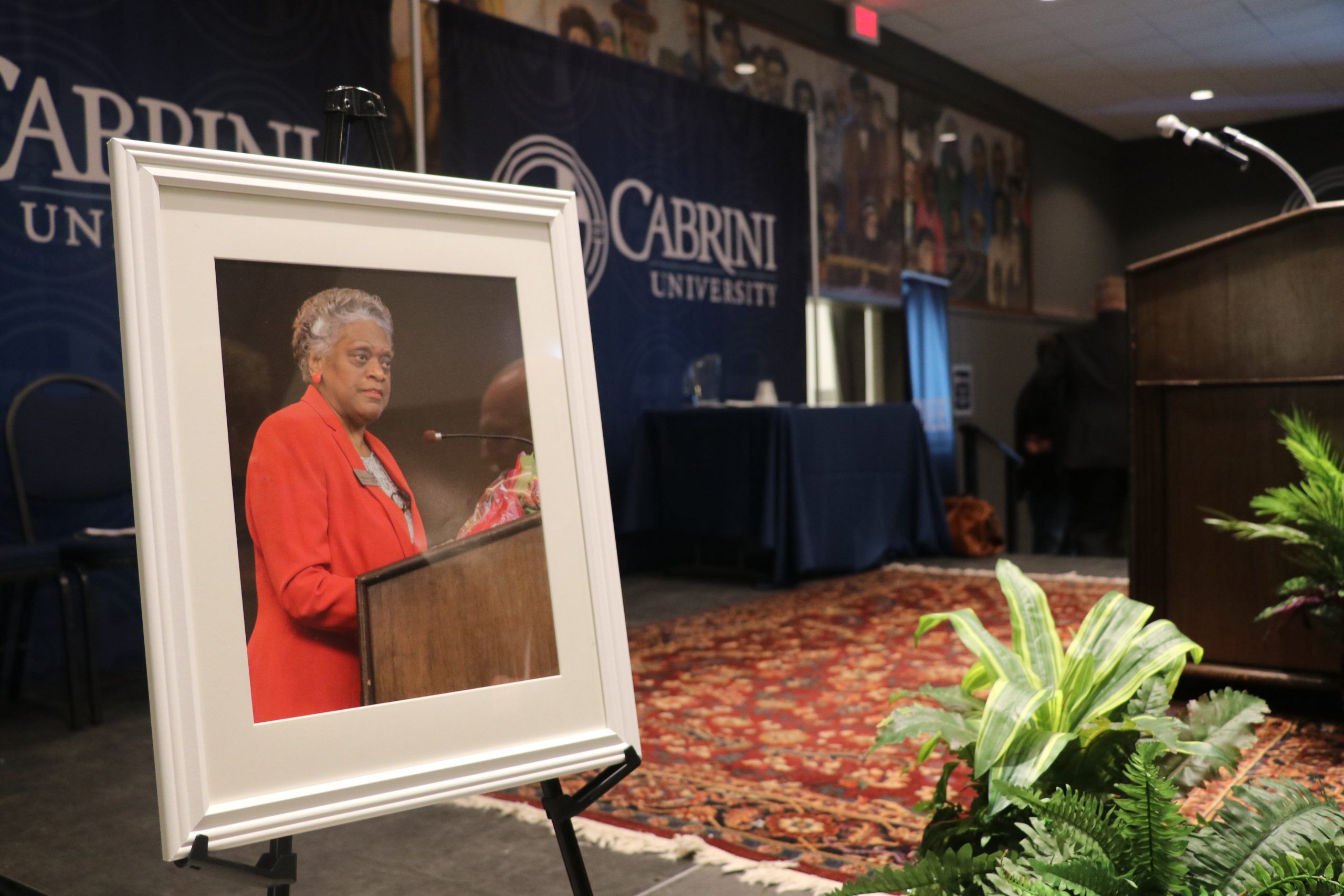Remembering Shirley Dixon
This being the first annual Shirley Dixon celebration of Urban Education without Dr. Dixon, faculty did not lament, instead, they honored her life in the only way that seemed fit, through action and advocacy

Every year, the Center for Urban Education, Equity, and Improvement hosts a conference and symposium honoring Dr. Shirley Walker Dixon and her accomplishments to serve the urban community.
Because Dixon had just died in November, flowers were still presented to her even without her present physically. They were placed in her chair with the belief that she was there in spirit.
“It was bittersweet. I say bitter because we’re still mourning her loss,” Dr.Ronald W Whitaker II, the director of the Center of Urban Education of Equity and Improvement, said.
“However, there was also sweetness,” Whittaker said. “Her life and legacy are going to continue. She knew that Cabrini University was really committed to this work around social justice, around equity, around engaging our school in community partners. I know she was confident of the faculty and staff that we have to continue this work in the tradition in which she started. She inspired so many to look at this issue as just not a class or an annual workshop. It’s important for the students and the community that we serve.”
Dr. Dixon was a important presence at Cabrini University in the school of education. “In many ways, she was the forerunner for this work, the catalyst. She passed the baton to me to continue this work around urban education,” Whittaker said. Just two days before her passing, Dixon was ecstatic to work with Whittaker and flesh out this year’s symposium. “Just the fact that I was able to get her affirmation before she passed on, gave me the hope to continue the work.”
The ceremony consisted of speeches and awards that honored her and her trailblazing work. The keynote speech by Tim Wise accentuated the issues of the education system and the ways by which it harms minorities, which emphasizes and implements the way Dixon fought so hard for urban education.

Keynote Speaker Tim Wise
Tim Wise has been on the road speaking at events for 26 years and has been doing anti-racism work for approximately 30 years.
Wise is passionate about being able to discover the path to equity. He made it clear that there can only be a few reasons as to why we have not been able to do so; We’re not as smart as we think we are despite people’s intellect or it’s due to us not being as good as we all claim to be.
But Wise doesn’t believe that the answer is either. He believes if people don’t get involved in education for the money or prestige, then it has to be for the purpose of education. This leaves another reason as to why not change has come about. “We must not really understand what we’re up against and we don’t understand the system we’re a part of and trying to change,” Wise said.
Equity is a challenging topic that few have been able to create change within. A couple of years ago during Hurricane Katrina, something caught Wise’s attention. He was watching a Spike Lee movie when Lee himself made a remark saying, “You know what happened in New Orleans was a system of monumental proportions” and Wise sat there thinking, ‘I don’t believe that.’
Wise continued, “If the system was never intended to support you and then proceeds to let you down, that’s not system failure, that is system success.”
The connection Wise made between New Orleans and education was that the system was not made for the poor and working-class of the black and brown communities. New Orleans in the past has a history of uprooting black communities by knocking down their businesses and homes to build interstate roads.
Wise made it clear that if anyone thinks that we don’t have equity in schools because that’s the system failing, then they are not paying attention. “This didn’t start from the premise that the American educational system was set up for black and brown people and if you believe that and you are in the field of education, then you need to find another career,” Wise said.
Wise believes that if a teacher thinks education is a great equalizer then they are lost. Education is not currently the great equalizer. “If education is the great equalizer, then how is that possible? It’s possible because it’s not an equalizer at all.”
The system does not support black and brown communities as it does white communities. “Right now, white households headed by high school dropouts, have one-third more wealth on average than black households headed by a college grad. So obviously, education is not the great equalizer. This system was not created for equity,” Wise said.
Never once has it probably happened that a guidance counselor in a prep school pulled aside a white rich and mediocre child who is a C student and say, “I think you should consider a career in fast food.”
“So what are we saying? We’re saying over the course of 200 plus years the purpose of American education, the function of it, has been the perpetuation of inequality, not equality. If we start with the premise that the system was set up to elevate some and literally destroy others, we have a fighting chance because at least we know the monster that’s under the bed,” Wise said.
If teachers don’t understand the system and its intentions, then they will blame themselves, blame the children or blame the children’s culture. They’ll blame everything but the system that they themselves are a part of.
“We don’t need education reformers, we need an educational revolution,” Wise said.

Shirley Dixon’s Vision
“There is a fierce urgency, now. We, as a group of leaders, don’t have time to play. These students we serve can’t wait five years from now for us to get our strategic plans together, for education reform to come together, or for a particular politician to save us. They need us now,” Whittaker said.
Whittaker emphasized that in our efforts, we have to go deeper. Many individuals are unaware of our history and we don’t know how our history shows up currently in our policies, in our practices, and in our discourse, Whittaker said.
“We need to know our history. We have to be courageous. It is imperative, we are walking in conformity and cowardice. We don’t want to call out these systems of oppression, we don’t want to call out these deficits, these racist ideologies,” Whittaker said.

There needs to be a new way to revolutionize the way leaders prepare their students, Whittaker said. Whittaker went into detail about how this includes different courses that need to be injected into the curriculum sequence, other professionals that need to be in front of these students, and to understand these policies that oppress those. Equity for not equality is a major operation that needs to occur.
“Dr. Dixon was an advocate. She advocated for students’ success. She didn’t talk about it, she advocated and she was very intentional about opening doors for students who were disenfranchised,” Whittaker said.
The key takeaway from the ceremony honoring Dixon is to talk about this system correctly. Building upon Wise’s words, Whittaker emphasized that every system is perfectly designed to deliver the results it produces.
“If the system is going to change, then we’re going to have to form a comprehensive assessment of this system. If we’re really going to change the narrative for minority students, whether that’s minority students, students whose first language isn’t English, students that are in impoverished communities, we’re going to have to do some radical and revolutionary changes within a system. If not, 20 years from now, we’re going to still be having the same conversation,” Whittaker said.



